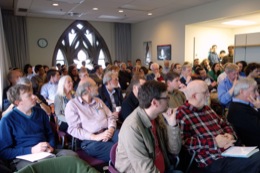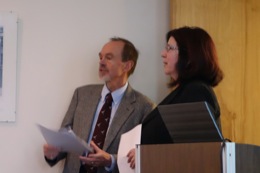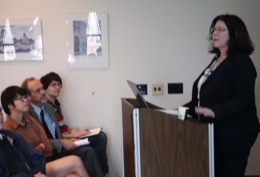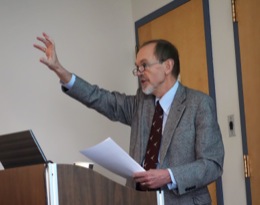

![]()
home
::: about
::: news
::: links
::: giving
::: contact
![]()
events
::: calendar
::: lunchtime
::: annual
lecture series
::: conferences
![]()
people
::: visiting fellows
::: postdoc fellows
::: resident fellows
::: associates
![]()
joining
::: visiting fellowships
::: postdoc fellowships
::: senior fellowships
::: resident fellowships
::: associateships
![]()
being here
::: visiting
::: the last donut
::: photo album
|
The Salmon Memorial Lecture There's been a quiet sense of expectation building throughout the day in advance of today's Salmon lecture by Philip Kitcher. It had started for me late yesterday afternoon when Philip Kitcher had suddenly materialized in my doorway, looking for Maria Kronfeldner. I knew in the abstract that he was coming. But I was still somehow unprepared for the concrete, beaming presence of the great eminence.
By the time the lecture was to start, we knew we had more people than seats. This was a popular lecture! Perhaps it was the memory of Wes Salmon. Or perhaps it was the reputation of Philip Kitcher. Or perhaps it was both. In any case, there was a lot of fussing about as we brought in more chairs. For a while it even seemed that Jim Woodward would need to stand at the front. Sandy Mitchell called the room to order. Hers was an unenviable task. Wes Salmon was one of the most beloved members of our community. Everyone who knew him was touched and changed by his wisdom, kindness and goodness. (More?) Somehow Sandy needed to put that sense into words, while standing before a packed room that included many of Wes's colleagues and friends and even Merrilee Salmon herself. She did a fine job and I will not try to reprise it here. She then handed over to Clark Glymour who had taken the job of introducing Philip. It was a job he took with pleasure, for he had been Philip's friend for many decades, since Philip's graduate student days. It was once again a warm and touching introduction. It concluded with something one rarely sees in these academic events: two greying scholars hugging with genuine affection. I was enjoying the moment too much to lift my camera and take a photo. We could now move to the intellectual content of the event. Philip was to speak on collective inquiry. His starting point was a familiar one. So many philosophers of science still think of the scientist as a Robinson Crusoe figure, carrying out investigations in brilliant isolation.
Philip has been thinking and writing about this problem for decades. His answer is elaborate and carefully thought out; and too detailed to gloss responsibly here. It did include the notion of certified results that are made available for communal use. In question time, I was surprised to find that both Michael Strevens and Peter Machamer challenged that last idea. Peter even made a nice speech on the unreliability of text books. Philip took all this with a gentle smile and gave slow, quiet responses. I expect he'd heard it before. Perhaps he even expected Clark's contrarian question: if our goal is to advance human well-being, don't we know enough science for that? Should we not just move all science funding directly to helping people?! Philip disputed the premise that further science will not bring significant human benefits, but seemed to concede Clark's point. That bothered me. Isn't the better response that it is another question of optimal distribution of resources? We might assign a lot our resources directly to helping humanity, knowing we have a good chance of success. We assign a smaller part to science, pursuing the long shot of a major advance for human well-being. The point had bothered me enough that, on Saturday morning, as Philip chatted in our lounge in advance of the SOSI conference, I interrupted and put the question to him. He explained. Clark had exposed a major element of his view. Philip urges that we maximize human welfare, rather than seeking truth as an end in itself. So, in the unlikely eventuality that our resources are better spent on advancing human well-being directly, then it should not go to science. It was worth pointing out, Philip thought. John D. Norton
|












